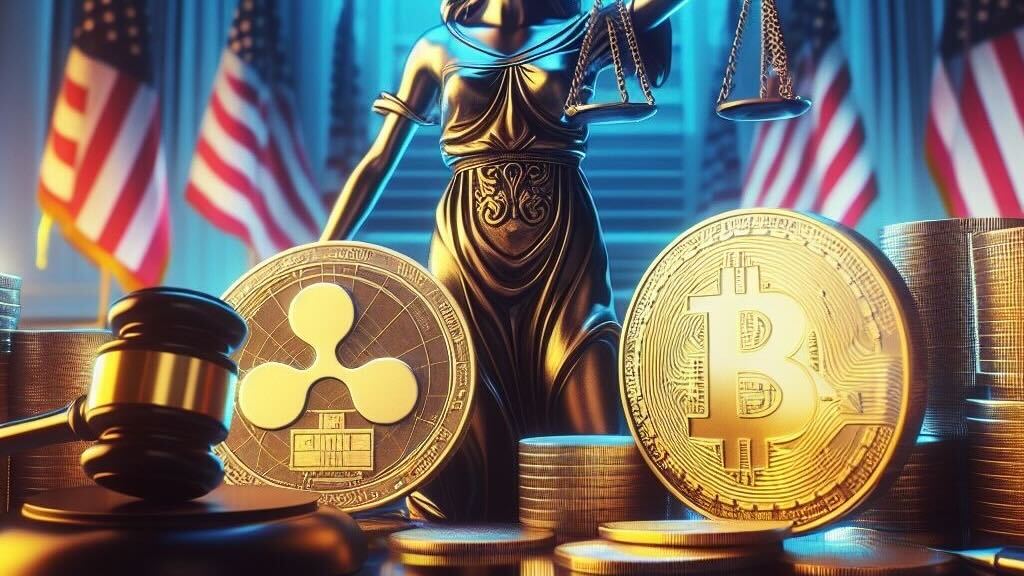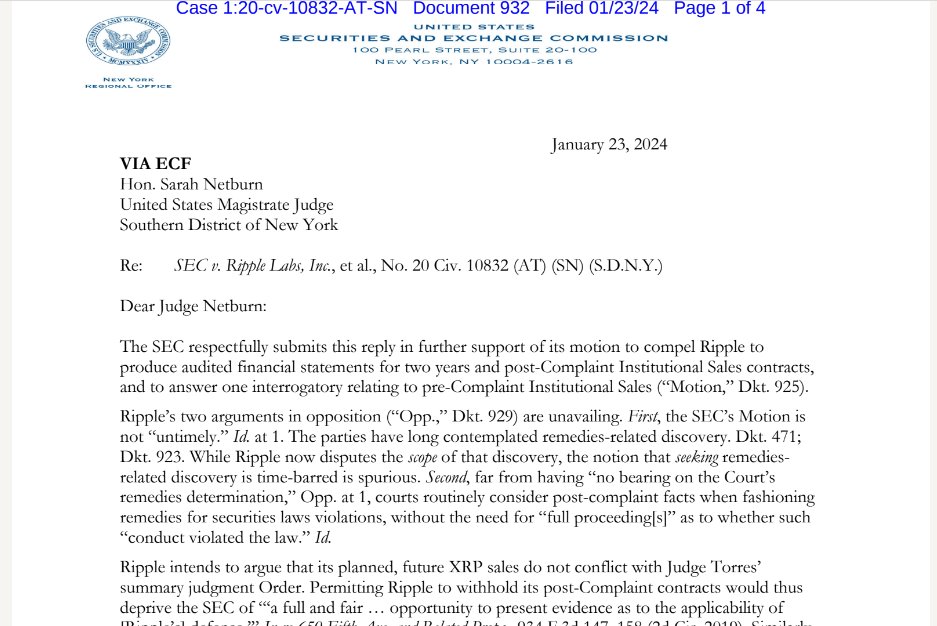SEC Responds to Ripple’s Rejection of Enforcement Motion, Demands Financial Evidence


In Brief
SEC responded to Ripple, contending that its discovery requests adhere to procedures and intended to impose penalties.

United States Securities and Exchange Commission (SEC) submitted a response to technology company Ripple’s (XRP) opposition regarding the provision of audited financial statements for a two-year period, information on post-complaint contracts related to the sale or transfer XRP to non-employee counterparties, and specifics on the amount of XRP Institutional Sales proceeds received after the lawsuit.
In a court filing on January 23, the SEC reinforces its motion to compel, arguing that its requests for discovery related to remedies adhere to proper procedures and are not untimely. Additionally, the argument emphasizes that, in cases involving securities law violations, courts commonly consider post-complaint facts through the lens of remedies.
Moreover, the SEC is pursuing penalties against Ripple, aiming to convey a strong message about the seriousness with which securities violations will be treated.
Notably, the SEC clarifies that it is not seeking a mini-trial or a determination regarding the legality of post-complaint sales to institutions, including on-demand liquidity (ODL) customers as such determinations are not necessary to obtain an injunction that could effectively stop these sales from continuing.

Ripple has the opportunity to present the argument that it plans to structure future ODL sales in a manner that falls outside the scope of the institutional sales category considered in summary judgment.
Contrarily, the SEC contends that having access to post-sale and post-summary decision contracts is crucial to assessing Ripple’s intentions and determining the commercial viability of structuring ODL sales in compliance with regulations.
The outcome of this matter might not result in a mini-trial, but its significance is substantial as the broad injunction has the potential to impact Ripple’s ODL business negatively. Lawyers anticipate that there will likely be a discovery process initiated for the examination of post-complaint contracts to gather more information on this issue.
SEC Presents Declaration by Carolyn Dicharry
Ripple asserted that the SEC did not initiate the discovery process when fact discovery was available, and currently lacks a valid reason for pursuing additional discovery related to post-complaint sales. Additionally, the SEC has exhausted all its interrogatories in the ongoing case.
In response to this, the SEC presented a declaration by Carolyn Dicharry, who served as a consultant for Ripple from 2015 to 2019. In her testimony, she affirmed that Ripple, via XRP II LLC, engaged in direct sales contracts for XRP with 23 specific counterparties. This information is based on Ripple’s business records spanning from July 2017 to April 2020.
The submission of this declaration adds a factual dimension to the ongoing legal proceedings, providing specific details about Ripple’s historical XRP sales contracts.
She additionally stated that the majority of XRP sales from May 2020 to June 2023 were conducted as ODL transactions, with XRP sourced directly from Ripple. Furthermore, she mentioned that Ripple also conducted some XRP sales on centralized digital asset exchanges through market-makers, with the purchasers being unknown.
SEC vs. Ripple Lawsuit Goes to Trial
Last year, the federal district judge sent the ongoing lawsuit involving the SEC and Ripple to trial, declining to issue a summary judgment regarding the classification of XRP as an unregistered security.
Judge Analisa Torres determined that XRP did not qualify as a security when traded on the secondary market. However, she concluded that it would be considered a security if sold within the framework of an investment contract to institutional investors.
Torres based her decision on her evaluation of Ripple’s “programmatic” sales, automated sales of XRP on exchanges, asserting that these did not constitute securities offerings, as the purchasers did not make investments in Ripple.
In October, Ripple marked the dismissal of all charges against its executives within the ongoing lawsuit. Following this development, the company has focused on its expansion efforts in Europe and Africa.
The SEC’s recent response to Ripple’s opposition signals a new juncture in the ongoing legal battle, introducing other facets to the Ripple case.
Disclaimer
In line with the Trust Project guidelines, please note that the information provided on this page is not intended to be and should not be interpreted as legal, tax, investment, financial, or any other form of advice. It is important to only invest what you can afford to lose and to seek independent financial advice if you have any doubts. For further information, we suggest referring to the terms and conditions as well as the help and support pages provided by the issuer or advertiser. MetaversePost is committed to accurate, unbiased reporting, but market conditions are subject to change without notice.About The Author
Alisa is a reporter for the Metaverse Post. She focuses on investments, AI, metaverse, and everything related to Web3. Alisa has a degree in Business of Art and expertise in Art & Tech. She has developed her passion for journalism through writing for VCs, notable crypto projects, and scientific writing. You can contact her at alisa@mpost.io
More articles

Alisa is a reporter for the Metaverse Post. She focuses on investments, AI, metaverse, and everything related to Web3. Alisa has a degree in Business of Art and expertise in Art & Tech. She has developed her passion for journalism through writing for VCs, notable crypto projects, and scientific writing. You can contact her at alisa@mpost.io






















































